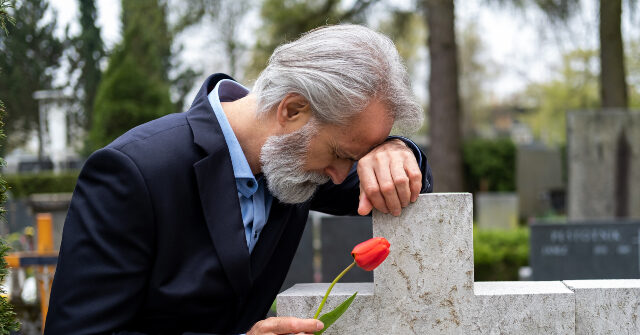A team of researchers has found that people can die of a broken heart after a loved one passes away.
A recent study published by the journal Frontiers in Public Health involved coauthor Mette Kjærgaard Nielsen, who is a postdoctoral researcher at Aarhus University in Denmark, and her colleagues, CNN detailed on Monday.
For over ten years, the team looked at the long-term health outcomes of bereaved relatives in Denmark and divided the group of nearly 2,000 into groups who felt lower and higher levels of grief during that time period.
CNN reported:
During the study period, 26.5% of the relatives who showed high levels of grief died, compared with 7.3% of those who were less powerfully affected.
These “high levels” of grief are defined as someone experiencing more than half of nine grief symptoms researchers have identified. These include feeling emotionally numb or that life is meaningless; experiencing difficulty accepting the loss; and experiencing confusion over their own identity.
The team of researchers also noted that those with higher levels of grief used more antidepressant medications, mental health services, and primary care services.
Nielsen explained to CNN, “Those with a high grief trajectory seem to be a vulnerable group of relatives already before the death, with need for special attention.”
In addition, there is such a thing as “broken heart syndrome” which is also known as takotsubo cardiomyopathy, according to UnityPoint Health.
The website describes “broken heart syndrome” as:
[A] reaction your heart has to a surge of stress hormones caused by an emotionally stressful event. Broken heart syndrome causes the heart to stop operating normally, resulting in heart failure. During these situations, the body releases an increase of hormones, which temporarily paralyzes your heart and limits its standard functionality.
The explanation notes that examples of high stress situations that can result in the syndrome include the death of a loved one, losing a job, divorce, or a terminal medical diagnosis.
However, UnityPoint Health Cardiologist Dr. Tim Martin asserts the symptoms are treatable:
Once providers make sure a patient isn’t experiencing a heart attack or other heart-related event, they can identify if feeling brokenhearted might be contributing. If a patient is diagnosed with broken heart syndrome, symptoms can be treated with medicine to help blood flow, prevent blood clots and help control blood pressure.
In June 2024, Breitbart News reported that 57-year-old Yossi Meir Jan, the father of freed Israeli hostage Almog Meir Jan, 21, died just hours before his son was rescued by Israeli forces, and his family said his cause of death was a broken heart after he endured eight months of his son being held by Hamas terrorists.
Read the full article here


